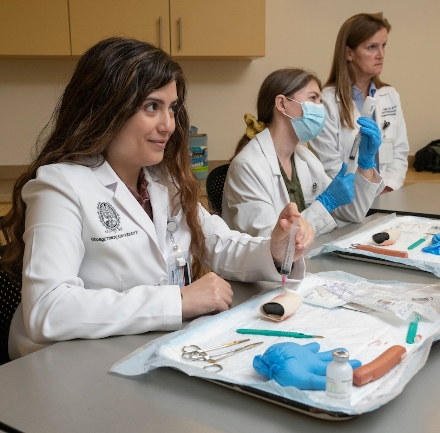Advance Your Nursing Expertise
With the Online Post-Graduate Certificate ProgramAdvance Your Nursing Expertise
With the Online Post-Graduate Certificate ProgramAdvance Your Nursing Expertise
With the Online Post-Graduate Certificate Program
Pursue Additional APRN Certifications With a Post-Doctoral/Post-Master’s Certificate
Georgetown University School of Nursing offers an online Post-Graduate Certificate (PGC) program.
The Post-Graduate Certificate program empowers advanced practice nursing professionals to advance their careers and pursue board certification in one of four Advanced Practice Registered Nurse (APRN) specializations: Family Nurse Practitioner (FNP), Adult Gerontology Acute Care Nurse Practitioner (AG-ACNP), Nurse-Midwifery (NM), and Women’s Health Nurse Practitioner (WHNP).
Students complete this post-doctoral/post-master’s certificate program on a part-time basis. Applicants must hold a bachelor’s degree from an accredited college or university in the United States or the equivalent from an international college or university, maintain a current registered nurse (RN) license, and have earned either (1) a Master of Science degree in Nursing1 from a CCNE- or ACEN-accredited program, or (2) a doctoral degree (DNAP, DNP, or PhD) to be eligible for consideration. Learn more about application requirements and admissions deadlines.
Post-Graduate Certificate Specializations 2
Family Nurse Practitioner (FNP)
19 minimum credits | 750 clinical hours
Provide primary care for the whole family across the life span in a variety of clinical settings. Graduates who earn their post-doctoral/post-master’s FNP certificate online will be qualified to manage all aspects of primary care, including wellness/prevention, and diagnosis and management of episodic and complex chronic conditions. The focus of coursework includes the care of children, adolescents, adults, pregnant and postpartum people, and older adults with an emphasis on developing a long-term relationship between the patient and FNP provider.
- Certification eligibility: Family Nurse Practitioner — Board Certified (AANP = FNP-C, AACN = FNP-BC)
Adult Gerontology Acute Care Nurse Practitioner (AG-ACNP)
16 minimum credits | 750 clinical hours
Provide care for adults and older adults in settings ranging from emergency departments and acute care hospitals to long-term acute care hospitals (LTACH). Students in this specialty manage a wide range of acute, critical, and complex chronic illnesses in both hemodynamically stable and unstable patients. The program prepares students to perform point of care ultrasound (POCUS) and perform invasive procedures such as intubation, central line insertion, thoracentesis, and lumbar punctures.
- Certification eligibility: Adult Gerontology Acute Care Nurse Practitioner — Board Certified (ACNP-BC).
Nurse-Midwifery (NM)
27 minimum credits | Up to 1,000+ clinical hours
Provide primary, sexual, reproductive health, antepartum, labor, birth, postpartum, and newborn care for individuals across the lifespan. With an emphasis on clinical approaches that address the holistic needs of patients while promoting health equity, the NM specialization prepares students to provide full scope midwifery care to the individuals they serve.
- Certification eligibility: Certified Nurse – Midwife (CNM)
Women’s Health Nurse Practitioner (WHNP)
22 minimum credits | 750–784 clinical hours
Provide primary, sexual, and reproductive health, antepartum, and postpartum care to individuals across the life-span.
- Certification eligibility: Women’s Health Nurse Practitioner – Board Certified (WHNP-BC)
Programmatic Outcomes
The Midwifery Program at Georgetown University School of Nursing has provided enrollment data, graduation data, attrition data, and board pass rates from 2019 – 2021 in the program’s programmatic outcomes document here.

Why Earn a Post-Graduate Certificate?
In today’s health care landscape, patient, family, and community health needs are evolving at a rapid pace and creating complex, interlocking primary and acute care challenges.
With these challenges comes a demand for highly skilled, compassionate midwives and APRNs who can demonstrate a deep understanding of multiple clinical specializations.
Nurses with expanded expertise have the ability to shape care at many levels, from improving care for patients and families to reducing health disparities in their communities to leading positive, systems-level change in their organizations
By earning a post-graduate certificate online from Georgetown University, APRNs can broaden their influence and advance their careers in several ways:
- Develop advanced clinical abilities in one of four APRN specializations.
- Become eligible for board certification in their chosen specialization.
- Complete graduate-level course work that is designed to match the rigor and quality of Georgetown University’s MS in Nursing program.
- Apply a values-based approach to patient and family care that is founded on the Jesuit ideal of cura personalis, or care of the whole person.
1 To be eligible for admission, non-practicing APRNs must demonstrate competence in advanced pathophysiology, advanced pharmacology, and advanced health assessment by successfully completing an Advanced Health Assessment Objective Clinical Intensive.
2The number of credit hours required to complete each specialization will vary. Each admitted student will follow an individualized plan of study based on a gap analysis conducted by faculty


